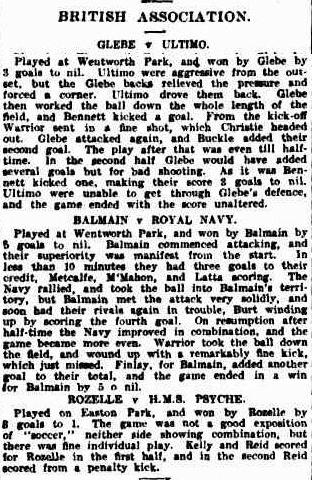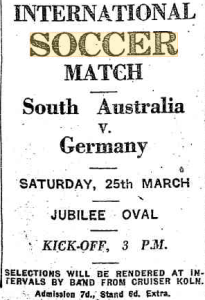For anyone who has met me in person, and perhaps a few of you who have read previous blog entries or listened to my podcast One On Wanderers, it doesn’t take long for my love of history and of most things German to bubble up to the surface. Throw in football and they’re the holy trifecta of hobby horses that I (often) ride on. I may not be an expert on the historical minutiae of the German competitive football (though I can heartily recommend the book ‘Tor’ by Ulrich Hesse-Lichtenberger as a starting point), and whilst I know of the German heritage of Manfred Schaefer and Mark Schwarzer I have zero knowledge of Australian soccer clubs that developed as a result of German migration to this country. However, thanks to the resources of the National Library Trove website and some previous exposure to both German and maritime football links to Australia, I’ve been able to piece together some notes about two Nazi warships and their soccer teams down under.
Having dabbled in the history of football in Australia one aspect that I have picked up on is the role that teams from foreign ships had in engaging with local clubs. As would be expected more often than not the majority of visiting ships’ teams were British, either Royal Navy or merchant marine. Take as a case in point this match report from the Sydney Morning Herald of 29th April 1907:
Interestingly enough in both of the two games were naval personnel played against local clubs the visitors went down (though HMS Psyche was part of the Royal Navy’s Australian Station so it may have had some local crew members, if not football players). At a time when Australian football was undoubtedly seen as a poor cousin to the other codes in this country, and exposure to foreign competition was often an ad hoc affair, then matches against British sailors must have served as some small taste of the international dimension for the sport down under.
I could ferret out some more British naval visitors who took on Australian football teams whilst visiting these shores, however returning to my earlier remarks about German history and soccer, thanks to the inestimable treasure that is Trove I have discovered some teasing nuggets about the German cruisers Köln (Cologne) and Karlsruhe and their links to soccer in this country in 1933 and 1934.
The visit of the Köln to Australia in the autumn of 1933 was at a most interesting point in Germany’s history, and came only 15 years after the end of the First World War (when the nascent Royal Australian Navy had claimed the sinking of the SMS Emden as one of the most important victories of that conflict’s sea battles). With Hitler’s Nazi Party only having just come to power in late January 1933, the Köln was at the vanguard of German diplomacy when that country was about to set out on a programme of major military expansion. The agenda was set by the ship’s captain, insofar as he was both looking to recognise Australian sensitivities to the (then) recent war and the losses incurred during that conflict, whilst also presenting the ‘face’ of a new Germany:
Obviously what was said by Captain Schniewind in the press item above was at best misguided, and at worst horrendous propaganda. However at the time the visit of the Köln was a major social event in all the ports it visited, engaged on a ‘charm offensive’ to nominally dispel enmities from the ‘Great War’ . In Fremantle the ship’s crew were gifted a kangaroo mascot, Seppl (joining a lion cub and cockatoo), whilst in Adelaide there was a performance by the ship’s band, visits to Adelaide University and a ‘smoke social’ at the German club.
When it came to sport the crew of the German warship were at a disadvantage when it came to mainstream Australian sports such as cricket and Australian Rules. However, and this is where I personally find the visit of the Köln fascinating from a local football history perspective, the ship’s crew had a team that played soccer games in almost every port she called in at, against Australian XIs.
The fact that the games between Australian teams and the Köln’s crew were presented as international matches indicates the desire by local football interests to put the code on a pedestal that particularly Australian Rules couldn’t reach. There was much made of the social, diplomatic and sporting benefits to be had by playing these matches. For example, when the Köln team met the Fremantle Soccer Club ticket sales went to the benefit of a fund for then recently deceased WA sportsman Ron Doig. In Adelaide though the South Australian team lost 2-3 the positive response to their performance was noted by interstate observers. In Hobart the Southern Tasmanian team won 2-0, and the match was played in front of ‘The largest crowd for many years…’, and when they met a RAN team in Sydney the visiting Germans gave the Australians a bit of a football lesson:
Now it would be very hard to make any comments on the lasting benefits of these games on Australian soccer without having more information to hand. My suspicion is this would’ve been minimal, as per any type of exhibition football match that is played even in this era (for example, the A-League All-Stars hardly revolutionised support for the code in Australia after two games, and are arguably best forgotten as PR stunts). However the importance of a team of foreign nationals taking on Australians in a sport that was still in its early years of development must have resonated for those who battled to keep football in the wider public consciousness. Of course when it comes to international relations, whatever was achieved by the visit of the Köln in autumn 1933 was wiped out a few short years later when it and other Kriegsmarine vessels were engaged in Nazi Germany’s war of aggression against countries such as Australia.
Almost a year later the Köln’s sister cruiser, the Karlsruhe visited Australia, however unlike the sporting contact between the locals and the first German ship’s crew, the 1934 football match schedule was far more limited. There was only the one match, and this was played in Brisbane against a metropolitan representative team (a first for the then recently reorganised Brisbane District Football Association). The Brisbane team went on to win this match 2-0 against the German navy squad, which was reported as being due to the ‘lack of condition and match practice‘, and I would assume that this match had far less resonance for the popularity and development of football in Queensland than the earlier Köln matches had interstate.
The significance of these two German ships’ crews playing soccer matches in Australia against local teams in the early days of the Nazi regime is not that crucial, not that important. I personally find the stories fascinating, but I also recognise that contrasted to other international team visits (such as the Indian tour of 1938) these exhibition games were more about entertainment and diplomacy than developing football in this country. However, as I mentioned above, the local football adherents were able to look to the visit of the German naval teams as a reaffirmation of the global context of soccer, when the indigenous code couldn’t do so, and both rugby codes were limited to other (mostly) English speaking nations. I believe it is also important to acknowledge these games as part of the long and significant football relationship conducted between Australia and Germany. Before there was Holger, before there was Ned Zelic playing in the Bundesliga, before there was Manfred Schaefer speaking on German TV about his 1974 team mates, there were the soccer teams from the Köln and the Karlsruhe.








